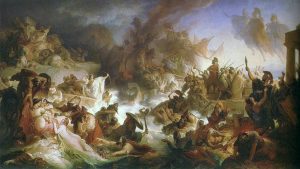Their capital was captured after The Battle of Thermopylae, so with long odds, the Athenians decided to put it all on the line at the Battle of Salamis.
by Warfare History Network Robert Barr Smith
In the summer of BC 481, a delegation from Athens arrived at Delphi in central Greece to consult with the oracle of Apollo. The Sanctuary was always crowded with people seeking advice from the god, or perhaps a glimpse into an uncertain future. The oracle was located in the temple of Apollo, a building perched on a slope that was reached by a winding Sacred Way. The Sacred Way was lined with splendid marble buildings, including treasuries where votive offerings and other objects of value were stored.
It was a magnificent display, mute but eloquent testimony to the shrine’s fame and influence, but the Athenians were in no mood for sightseeing. King Xerxes of Persia was making preparations to invade Greece; even now his forces were marshaling and a mighty armada was being assembled. Nine years earlier, the Athenians had defeated a Persian invasion force at Marathon sent by Xerxes’ father, Darius. It was a setback Xerxes was not likely to forgive, much less forget. It was clear Athens was going to be a special target of the Great King’s ire.
Apollo’s prophecies were given substance through a medium called the Pythia. Accounts differ slightly, but apparently she was seated on a tripod near the omphalos (navel), a stone that was said to mark the center of the world. Some say she chewed laurel leaves, others that she inhaled burning laudanum, or even breathed vapors issuing from a rock cleft. Whatever means were used, the Pythia fell into a trance, and while in the trance babbled incoherently. These ravings were messages from Apollo, and were duly recorded by nearby priests for translation.
A Grim Future for Greece
Aristonice the Pythia took her seat, separated from the Athenian petitioners by a veil. She soon fell into a stupor, then began raving in a voice that none could understand. The gibberish was carefully recorded, and when the message was translated it was far from comforting. “Leave your homes,” it began, “and fly to the ends of the earth.” The message continued that “all is lost,” and prophesied that “many shrines of the gods” would meet a “fiery destruction.”
The Athenians’ blood ran cold; here was a dire prediction of utter ruin. Stomachs knotted with anxiety, faces downcast, they left the temple in a state of deep depression. But one, Timon, a man who lived in Delphi and probably was attached to the Temple of Apollo in some way, told the Athenians to try again. If they returned with an olive branch, a token of supplication, maybe Apollo would reconsider his harsh words.
They did as advised, and Aristonice delivered a second prophecy. It was the last lines that gained the most attention. “Wide-seeing Zeus grants to Athena, triton-born, that the wooden walls alone remain unbreached.… O divine Salamis! You shall destroy the children of women.…”
The second prophecy offered a glimmer of hope, but as usual the words were ambiguous and subject to interpretation. What, for example, were the “wooden walls”? The salvation of Athens, and Greece itself, might well rest on the right answer.
The Athenian leader Themistocles was to become a central figure in the debate over the interpretation of the prophecy. A leading proponent of naval power, Themistocles was certain the “wooden walls” meant a powerful Athenian fleet. In fact, if Athens had a fleet at all it was due to the courage and persistence of this one man.
When Athens triumphed over the Persians in BC 490 most Athenians believed the threat was over. Persia was far away, and the bloody nose the “barbarians” had received at Marathon seemed to end the matter once and for all. But Themistocles was unconvinced the Persians were gone for good. He believed Athens’ salvation, and ultimately all of Greece’s as well, would be in sea power. But beyond the Persian threat, there are indications he dreamed of Athens as the hub of a great empire, where trade and tribute would flow into the city from every part of the Mediterranean world.
In the BC 480s Themistocles was instrumental in developing the port of Piraeus, about four miles from Athens. Work was put in hand to build a naval arsenal and harbor facilities, but progress was slow. In November, BC 486, King Darius died and was succeeded by his son Xerxes. In the later years of his reign Darius had been preoccupied by a revolt in Egypt and other matters, but never lost the idea of wreaking vengeance on the Greeks and adding them to his empire. Now it was up to his son to carry these projects to their conclusion.
https://nationalinterest.org/blog/buzz/salamis-how-greece-stopped-persia-and-changed-history-forever-32237




